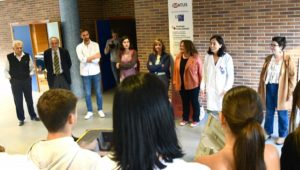A group of students from Sar Secondary School (IES) visited iMATUS to get a firsthand experience of the design and processing methodologies of new 2D and 3D materials.
This visit took place within the framework of the ‘Colabora e Innova no teu Barrio’ program, promoted by the Sustainable and Integrated Urban Development Strategy (EDUSI) Revive Santiago. The program aims to bring innovation, digital manufacturing, and digitization to the citizens of Santiago de Compostela in the coming months.
Through this program, the Institute of Materials fosters knowledge in the STEM field among young students, thanks to a team of over 150 senior and junior researchers specializing in materials for health, energy, environment, industry, and innovation. Carmen Álvarez, director of iMATUS, stated, “iMATUS collaborates by bringing the latest advancements in the field of science and materials technology to educational institutions in Santiago de Compostela.”
iMATUS becomes the first center of the University of Santiago de Compostela to join this initiative, with more visits expected in the coming weeks. In addition to iMATUS, other unique research centers participating in these meetings to inspire scientific vocations among pre-university youth include the Center for Molecular Medicine and Chronic Diseases (CiMUS), the Center for Biological Chemistry and Molecular Materials (CiQUS), the Center for Intelligent Technologies (CiTIUS), the Galician Institute of High Energy Physics (IGFAE), and the Interdisciplinary Research Center in Environmental Technologies (CRETUS).
‘Colabora e Innova en tu Barrio’ includes the development of two intergenerational spaces and processes to introduce the maker culture (the culture of creating, searching, designing, thinking, and developing simple or non-professional solutions for technologically complex projects) to owners and staff of traditional industries and businesses in the neighborhoods of Santiago de Compostela. It also involves the intergenerational transmission of knowledge in Information and Communication Technologies (ICT) from younger to older populations, aiming to bridge the technological gap. Furthermore, it encompasses the dissemination of this knowledge and the application processes of the maker culture in traditional businesses among children and families.

During the visit, Carmen Álvarez, director of iMATUS, accompanied the students.
Photos: Santi Alvite.



